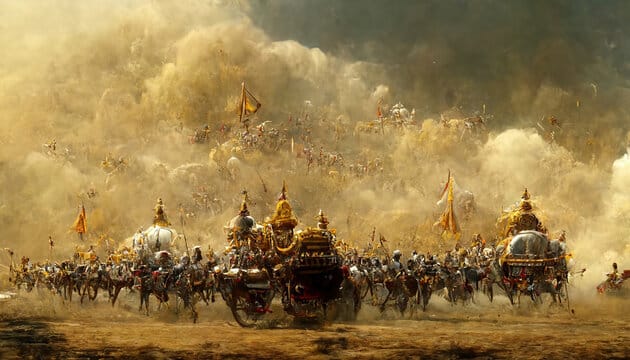
Spirituality
The Laws of Karma: Lessons from the Mahabharata
After 18 days of relentless conflict, the brutal war of Kurukshetra finally drew to a close, leaving behind a trail of immeasurable loss and sorrow. In the aftermath of Duryodhana’s demise at the hands of Bhima in a fierce duel, the Pandavas, guided by their profound reverence for righteousness, entrusted Lord Shri Krishna with the solemn task of offering solace to the grieving parents. Thus, Lord Shri Krishna, the epitome of divine wisdom and compassion, stood before King Dhritarashtra, a father burdened by the anguish of losing a hundred sons.
King Dhritarshtra, a grieving father, asked the Lord, “The loss of even a single son pierces the soul with the deepest sorrow imaginable. Yet, here I stand, bereft of a hundred of my beloved, powerful, and beautiful children. Why must I endure such an immense and crushing loss?”
With gentle wisdom, Lord Krishna began, “Fifty lives ago, in a distant time, you were a hunter. One day, you aimed for a male bird, but it escaped, leaving you angered. In your fury, you found the nest and took the lives of a hundred innocent chicks, leaving their father to witness the sorrow.
Dhritarashtra listened, his heart heavy with understanding. “But why, Lord Krishna, did I endure this pain after fifty lifetimes?”
Krishna’s eyes shimmered with divine knowledge. “For fifty lifetimes, you walked the path of righteousness, earning pious credits for the noble deed of fathering a hundred sons. And so, the karmic wheel turned, and the consequence of your past sin found you, as the weight of your actions caught up after many lifetimes.”
Dhritarashtra nodded, enlightened by Krishna’s words. “I see now, Lord Krishna, the intricate dance of karma, weaving through lifetimes to balance the scales of justice.”
With a serene smile, Krishna blessed Dhritarashtra, guiding him to accept the unfolding of destiny with grace and understanding. As the sun dipped below the horizon, casting a golden glow over the war-torn land, Krishna spoke further, “In every action, there is a seed of consequence, waiting to sprout and bear fruit in its own time.”
“Your journey, Dhritarashtra, serves as a reminder that no deed, whether noble or wicked, goes unnoticed by the universe. Each moment is a thread woven into the tapestry of existence, shaping our destinies.”
Dhritarashtra bowed his head in reverence, feeling the weight of Krishna’s words settle upon his soul like a gentle breeze. Thus, amidst the whispers of the wind in the quiet aftermath of war, Dhritarashtra found solace in the eternal wisdom of the divine, his heart liberated by the truth of karma and the enduring power of forgiveness.
Krishna’s teachings echoed in the chambers of his heart, guiding him towards a life of righteousness and inner peace. In the embrace of the divine, Dhritarashtra discovered that even amidst the darkest of times, the light of wisdom shines bright, illuminating the path toward spiritual enlightenment and eternal freedom.
In Bhagavad Geeta Chapter 4, verse 17, Lord Krishna says,
कर्मणो ह्यपि बोद्धव्यं बोद्धव्यं च विकर्मण: | अकर्मणश्च बोद्धव्यं गहना कर्मणो गति: ||
Karmano Hyapi Bodadhvayam Cha Vikarmanah|
Akarmanascha Bodadhvayam Gahana Karmano Gatihi||
Here, Shri Krishna teaches us that there are three kinds of actions.
First is action (Karma). These are good deeds advised by sacred texts. They help control our senses and make our minds pure.
Then there’s forbidden action (Vikarma). These are evil deeds that sacred texts tell us not to do. They harm us and make our souls weaker.
Finally, there’s inaction (Akarma). These are actions done without wanting anything in return, just to please God. They don’t bring any good or bad results, and they don’t tie our souls down.
This story gives three crucial takeaways.
Karma – Action and Consequence:
Everything we do has a consequence, whether it’s good or bad. Just like when King Dhritarashtra suffered for harming innocent birds in a past life, our actions catch up with us eventually.
Path of Righteousness:
It’s important to do good deeds and follow the right path. Even though Dhritarashtra was a good person for many lifetimes, he still faced consequences for his past mistakes. This teaches us the importance of consistently doing good.
Acceptance and Forgiveness:
Dhritarashtra learned to accept his fate with grace. No matter what happens, we should try to understand and accept it, like Dhritarashtra did when Lord Krishna explained his situation.
In simpler words, the story teaches us to do good deeds, accept the consequences of our actions, and strive to follow the path of righteousness. It’s about understanding that our actions have consequences and making choices that lead to inner peace and spiritual growth.
Please subscribe to our mailing list to stay connected and receive spiritual information. If you have any queries, please write to us at info@chamundaswamiji.com. You can check out our YouTube channel, Chamunda Swamiji, where you can learn Tantra, Mantra, Yantra, and Meditation from His Holiness Shri Chamunda Swamiji. If you seek to learn Shakti Kriya, please register with us, and we will get back to you.
Post a Comment
-
Subscribe to Our Blog
-
Categories
-
Popular Articles
- Dead moth in the house. What universe is trying to tell you?
- Spiritual Meaning of Moth
- Vivah Bandhan Curse – What Is It and How to Spiritually Heal It.
- What are Beej Mantras?
- The Dasa Mahavidyas
- Tripura Sundari | The Dasa Mahavidya
- Maa Bhuvaneshwari | The Dasa Mahavidyas
- Ramakrishna Paramhansa – The Man who almost became a Woman
- The Five Shades of Tantra
- Maa Chinnamasta | The Dasa Mahavidyas



